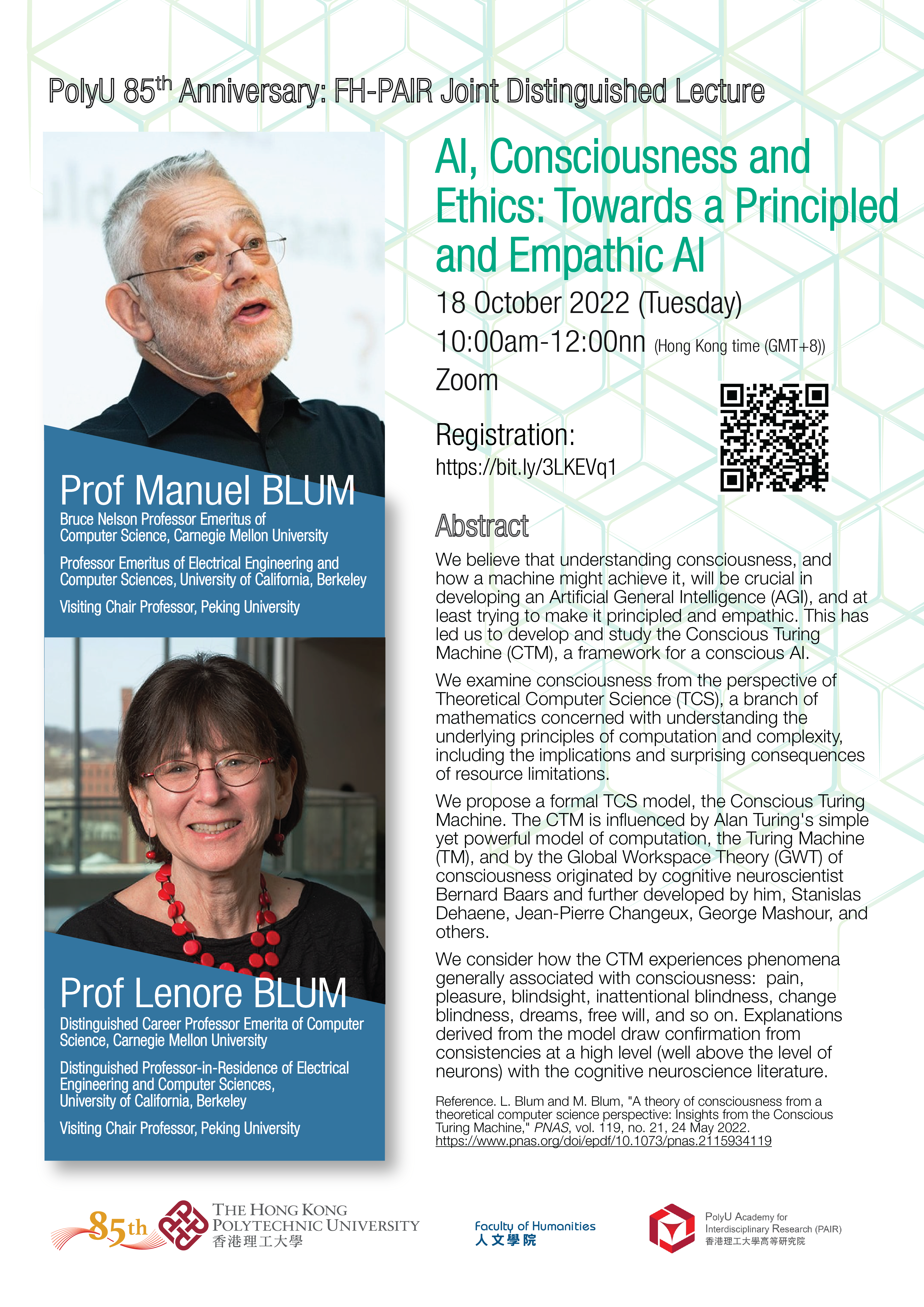PolyU 85th Anniversary: FH-PAIR Joint Distinguished Lecture: AI, Consciousness and Ethics: Towards a Principled and Empathic AI
Conference/Seminar

-
Date
18 Oct 2022
-
Organiser
Faculty of Humanities, PAIR
-
Time
10:00 - 12:00
-
Venue
Zoom
Remarks
The talk will be conducted in English.
Summary
Abstract
We believe that understanding consciousness, and how a machine might achieve it, will be crucial in developing an Artificial General Intelligence (AGI), and at least trying to make it principled and empathic. This has led us to develop and study the Conscious Turing Machine (CTM), a framework for a conscious AI.
We examine consciousness from the perspective of Theoretical Computer Science (TCS), a branch of mathematics concerned with understanding the underlying principles of computation and complexity, including the implications and surprising consequences of resource limitations.
We propose a formal TCS model, the Conscious Turing Machine. The CTM is influenced by Alan Turing's simple yet powerful model of computation, the Turing Machine (TM), and by the Global Workspace Theory (GWT) of consciousness originated by cognitive neuroscientist Bernard Baars and further developed by him, Stanislas Dehaene, Jean-Pierre Changeux, George Mashour, and others.
We consider how the CTM experiences phenomena generally associated with consciousness: pain, pleasure, blindsight, inattentional blindness, change blindness, dreams, free will, and so on. Explanations derived from the model draw confirmation from consistencies at a high level (well above the level of neurons) with the cognitive neuroscience literature.
Reference. L. Blum and M. Blum, "A theory of consciousness from a theoretical computer science perspective: Insights from the Conscious Turing Machine," PNAS, vol. 119, no. 21, 24 May 2022. https://www.pnas.org/doi/epdf/10.1073/pnas.2115934119
About the speakers
Manuel Blum (PhD, MIT) is Bruce Nelson Professor Emeritus of Computer Science at Carnegie Mellon University, Professor Emeritus of EECS at UC Berkeley, and Visiting Chair Professor at Peking U.
Manuel has been motivated to understand the mind/body problem since he was in second grade when his teacher told his mom she should not expect him to get past high school. As an undergrad at MIT, he spent a year studying Freud and then apprenticed himself to the great anti-Freud1 neurophysiologist, Dr. Warren S. McCulloch, who became his intellectual mentor. When he told Warren (McCulloch) and Walter (Pitts) that he wanted to study consciousness, he was told in no uncertain terms that he was verboten to do so - and why (there was no fMRI at the time). As a graduate student, he asked and got Marvin Minsky to be his thesis advisor.
Manuel is one of the founders of complexity theory, a Turing Award winner, and has mentored many in the field who have chartered new directions ranging from computational learning, cryptography, zero knowledge, interactive proofs, proof checkers, and human computation. He is a Fellow of AAAS1, AAAS2, NAS, NAE.
Lenore Blum (PhD, MIT) is Distinguished Career Professor Emerita of Computer Science at Carnegie Mellon University, Distinguished Professor-in-Residence of EECS at UC Berkeley, and Visiting Chair Professor at Peking U.
Lenore’s research, from her early work in model theory and differential fields (logic and algebra) to her work in developing a theory of computation and complexity over the reals (mathematics and computer science) has focused on merging seemingly unrelated areas. Her book, Complexity and Real Computation, written with Felipe Cucker, Mike Shub and Steve Smale2, develops a theoretical basis for scientific computation in continuous domains akin to the Turing-based theory for discrete domains. Her current research with Manuel and Avrim Blum, inspired by theoretical computer science and major advances in cognitive neuroscience, lays designs for a conscious AI.
Lenore is internationally known for her work in increasing the participation of girls and women in STEM and is proud that CMU has gender parity in its undergraduate CS program. Over the years, she has been active in the mathematics community: as President of the Association for Women in Mathematics (AWM), Vice-President of the American Mathematical Society (AMS), Chair of the Mathematics Section of the American Association for the Advancement of Science (AAAS), Deputy Director of the Mathematical Sciences Research Institute (MSRI), and as Inaugural and current President of the Association for Mathematical Consciousness Science (AMCS). She is a Fellow of AAAS, AMS, AWM.
1 Where Freud (1927) had written The Future of an Illusion, McCulloch (1953) followed with “The Past of a Delusion”.
2 Written while she was Visiting Professor of Mathematics at CityU, Hong Kong, 1996-1998.




